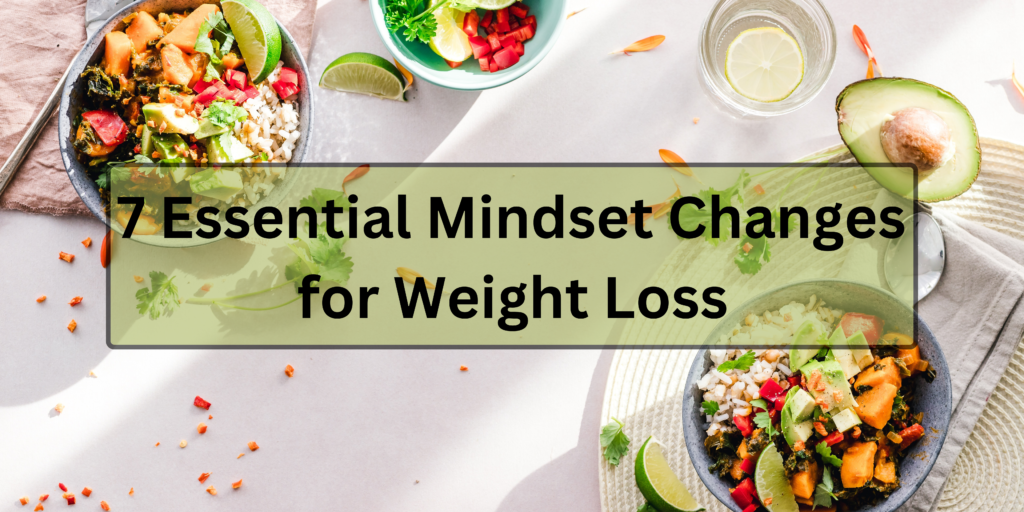Learn how to change your mindset in 7 easy steps to make weight loss much easier.
Eventhough there is tons of advice on the internet regarding the right foods and diets for weight loss, most of our attempts to achieve the body we want still fail. Mindset plays a crucial role in the weight loss transformation process. It influences our thoughts and behaviors related to our body, food, and exercise. Developing a positive and healthy mindset can significantly impact your ability to achieve and maintain weight loss goals.
As a psychologist specialized in behavorial changes, I know how closely our beliefs are related to our actions that eventually turn into habits.
That´s why in this post, you will learn 7 mindset changes for weight loss, that will definitely have a positive impact on your weight loss transformation:
- Start seeing food as fuel.
- Practice mindful eating.
- Stop any extreme food restrictions.
- Listen to your body.
- Focus on progress, not perfection.
- Believe in your ability to change.
- Overcome emotional eating.
The 7 Key Mindset Changes for Weight loss
Here are the steps to follow.
1. Start seeing food as fuel.

When trying to lose weight, many of us eventually fall into a mindset that views food as mere calories. But in order to achieve long term results that last a lifetime, you need to start embracing the concept of nourishment.
The key to sustainable weight loss lies in recognizing that what we eat is not just about numbers on a scale, but about fueling our bodies with essential nutrients. That means choosing fresh fruits and vegetables, lean proteins, whole grains and healthy fats on a daily basis.
By prioritizing nutrient-dense, whole foods, we provide our bodies with the vitamins, minerals, and beneficial compounds they need to thrive. That way we feel more energized and full for longer, which in turn makes it so much easier to sustain a healthy diet over time.
How to start: Even if you still want to count your calories (that´s totally fine, do whatever works best for you!), try to include a variety of different whole foods to your diet everyday and make an effort to consciously appreciate all the benefits they will have for your body.
2. Practice mindful eating.

In our fast-paced and hectic lives, it’s all too easy to mindlessly consume our meals without truly savoring or acknowledging what we’re eating.
However, the practice of mindful eating offers a lot of benefits when trying to lose weight. Mindful eating means bringing our full attention to the present moment, engaging our senses, and savoring each bite. By slowing down and tuning into our body’s hunger and fullness cues, we can make more conscious choices about what and how much we eat.
This shift in mindset allows us to break free from automatic or emotional eating patterns and cultivate a deeper connection with our body’s needs. By embracing the power of mindful eating, we unlock the potential to make healthier food choices, enjoy our meals more fully, and develop a sustainable relationship with food that supports our weight loss goals.
How to start: Start by sitting down to calmly enjoy one meal per day. Depending on your schedule, it might be a good idea to begin with dinner, when you have already finished your work for the day and it will be easier for you to focus just on the present moment. Or maybe breakfast works best for you, if you have kids and you can have breakfast before they wake up. Once you have mastered mindful eating during one meal, start implementing it also on other meals and you will notice the positive impact it has on your weight loss journey. If you want some extra support, you can find very helpful mindful eating apps on Google Play or the App Store.
3. Stop any extreme food restrictions.

In the pursuit of weight loss, extreme food restrictions have become all too common. But refraining ourselves from eating our favourite foods, will most probably lead to even more cravings, which in turn make sustainable weight loss even harder. It is not necessary to completely ban any foods from your diet, as long as you focus on fueling your body with all the essential nutrients that it needs to thrive on a daily basis.
In fact, as soon as you give yourself permission to eat those foods that were previously off limits, you will realize that your cravings will eventually become much less frequent. At first it might be a challenge to allow restricted foods back into your diet, but if you want to see long term success in your weight loss journey, this mindset change is crucial.
How to start: Avoid labeling foods as “good” or “bad” and allow yourself flexibility to enjoy that chocolate bar you love. This shift in mindset will allow you to cultivate a healthier relationship with food, making choices that support long-term success rather than seeking short-lived outcomes.
4. Listen to your body.

In our fast-paced and food-abundant world, it’s easy to lose touch with our body’s natural hunger cues. However, listening to and honoring these cues is a fundamental mindset shift that can significantly support our weight loss journey. Our bodies have an innate wisdom when it comes to signaling hunger and fullness, and tuning into these cues can help us make more mindful and balanced food choices.
By paying attention to our physical sensations and eating when genuinely hungry, we can avoid mindless snacking or emotional eating. Similarly, stopping eating when comfortably satisfied prevents overeating and promotes portion control. Cultivating this awareness and respect for our body’s hunger cues empowers us to nourish ourselves in a way that ultimately leads to sustainable weight loss and a harmonious relationship with food.
How to start: Our body needs some time to start signaling that it is full. That means it is essencial to slow down when eating. Another easy way to start listening to your bodies hunger cues is taking a break before repeating or ordering a dessert. If you are still hungry after waiting a couple of minutes, you are always on time to have a second.
5. Focus on progress, not perfection.

In the pursuit of weight loss, many of us fall into the trap of striving for perfection. We set impossibly high standards, expecting flawless adherence to rigid diets or exercise regimens. However, a mindset shift towards focusing on growth rather than perfection can be a game-changer in our weight loss journey.
If you expect perfection, you are much more likely to give up if some days you don´t manage to stick to your plan. Instead, try to learn from setbacks, and focus on the most important thing: not giving up. Embracing growth means recognizing that progress is more important than reaching an unattainable ideal. It’s about celebrating small victories and continuously improving our habits and behaviors.
How to start: If any day you skip your diet and eat more than what you had planned for the day, don´t try to compensate by eating less to next days. This would only lead to more hunger and cravings and increase the chances of “failing” again. For long term success, don´t punish yourself and focus on tuning in to your bodies hunger cues and mindful eating, which can help prevent overeating in the future.
6. Believe in your ability to change.

One of the most transformative mindset changes for weight loss is believing in your ability to change. The power to transform your body and achieve your goals lies within you. Cultivating this belief in yourself is essential for long-term success. Recognize that change is possible and that you possess the strength, resilience, and determination to make it happen.
For that it is essential to banish self-doubt and negative self-talk, and replace it with self-empowerment and positive affirmations. Trust in your capacity to overcome challenges and keep moving forward. By nurturing the belief in your ability to change, you unlock the motivation, commitment, and perseverance needed to reach your goals and create a healthier, happier version of yourself.
How to start: If you struggle a lot with negative self-talk, you can put up small reminders with positive affirmations around your house or in any places you look at often, like in your office or on your computer. This can help substitute negative thoughts and after a while you will have interiorized the new and more positive ways of thinking, so you won´t the written reminders anymore.
7. Overcome emotional eating.

Emotional eating might be the most difficult obstacle to overcome in our weight loss journey, as it often involves using food as a source of comfort or stress relief.
Breaking free from emotional eating requires a powerful mindset shift. Start by increasing self-awareness and recognizing the triggers that lead to emotional eating episodes. Explore alternative coping mechanisms, such as practicing any physical activity you enjoy, focusing on mindfulness or deep breathing, journaling, or seeking support from others.
How to start: If you struggle with emotional eating, try to cultivate self-compassion and embrace the understanding that food does not have to be our sole source of comfort. Emotional eating is not an easy habit to overcome, but it is possible if you focus on implementing step by step the essential mindeset changes proposed in this blog post.
The Key Mindset Changes for Weight loss: FAQs (Frequently Asked Questions)
Mindset refers to our attitudes, beliefs, and thoughts about weight loss, which greatly influence our behaviors and actions towards achieving our goals.
Mindset plays a crucial role in weight loss as it affects our motivation, decision-making, and ability to sustain healthy habits. A positive and determined mindset can enhance our chances of success.
Absolutely. Mindset plays a vital role in food choices by influencing attitudes towards nutrition, portion control, emotional eating, and the ability to make healthier and more balanced decisions.
Common mindset shifts for sustainable weight loss include focusing on long-term progress rather than quick fixes, embracing self-compassion, prioritizing health over appearance, and developing a growth mindset.
Yes, mindset is crucial for long-term weight maintenance as it helps sustain healthy habits, prevent relapses, and maintain a positive and balanced relationship with food and exercise.
Summary
As you can see, these mindset changes for weight loss are not difficult to start with.
Sticking with them and making them a habit can be the hard part. For that, it is essential to combine the 7 seven changes as they have a positive influence on each other and together make up a really powerful combination.
To recap, the 7 mindset changes for weight loss are:
- Start seeing food as fuel.
- Practice mindful eating.
- Stop any extreme food restrictions.
- Listen to your body.
- Focus on progress, not perfection.
- Believe in your ability to change.
- Overcome emotional eating.
